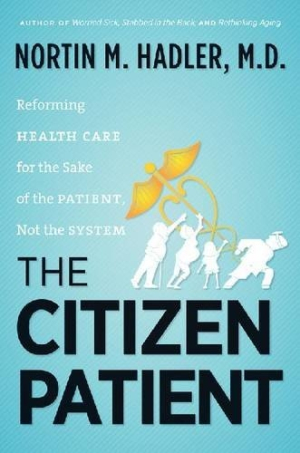The Citizen Patient
Reforming Health Care for the Sake of the Patient, Not the System
The problem with health care in America is it’s run by health-care professionals, author says, in book that urges citizens to take control of decisions.
In a clarion call to consumers, colleagues, and policymakers, Dr. Nortin Hadler, in The Citizen Patient, warns that aspects of America’s health-care system are so corrupt and ethically compromised that we’re all at risk of succumbing to its harmful effects. Yet, he also offers a vision for how to restore the once-safe harbor citizens have relied on from cradle to grave.
Hadler, a long-standing professor and rheumatologist at the University of North Carolina, lays bare what he sees as the most egregious offenses being perpetrated on patients: excessive over-diagnosis, over-treatment, and overhead; conflicts of interest among physicians, drug firms, and medical device companies; and clinical drug trials with little oversight and frequently meaningless outcomes. While the United States annually spends about $6,000 per person on health care (approaching 20 percent of our GDP), we’re not getting much bang for our buck. In a United Nations study of twenty-eight “resource-advantaged” countries, for example, the United States ranked first in reaching the Pearly Gates.
So where’s our money going? According to Hadler, it’s going into the pockets of stakeholders, including pharmaceutical reps and drug companies, medical device manufacturers, insurance companies, and high-priced hospital administrators. All, he says, keep cash flowing into their coffers without proffering any benefit to patients. He provides as evidence numerous clinical trials that demonstrate no greater efficacy of one drug over another—or, in some cases, any drug. He points to sham knee and spine surgeries that show results similar to “real” surgeries. He reveals findings from studies that bring into question America’s love affair with open-heart surgery and other risky cardiac interventions.
The Citizen Patient isn’t all doom and gloom, though. It’s an eye-opener for those not privy to what goes on inside the once-hallowed halls of hospitals and health-care systems. It’s also chock-full of information for citizens who want to take charge of their health for their own sake. Hadler’s suggestions aren’t radical; rather, they’re rational: evidence-based medicine, stringent medical device licensing guidelines, and restoration of the physician-client partnership, among others.
There’s a lot to digest in Hadler’s exhaustive look at America’s health-care system and much to consider in his compelling vision for what it might become. Unfortunately, the average patient, the citizens he hopes to reach, may struggle with the jargon-laden and research-thick text, despite its considerable merit.
Reviewed by
Chris Henning
Disclosure: This article is not an endorsement, but a review. The publisher of this book provided free copies of the book to have their book reviewed by a professional reviewer. No fee was paid by the publisher for this review. Foreword Reviews only recommends books that we love. Foreword Magazine, Inc. is disclosing this in accordance with the Federal Trade Commission’s 16 CFR, Part 255.

